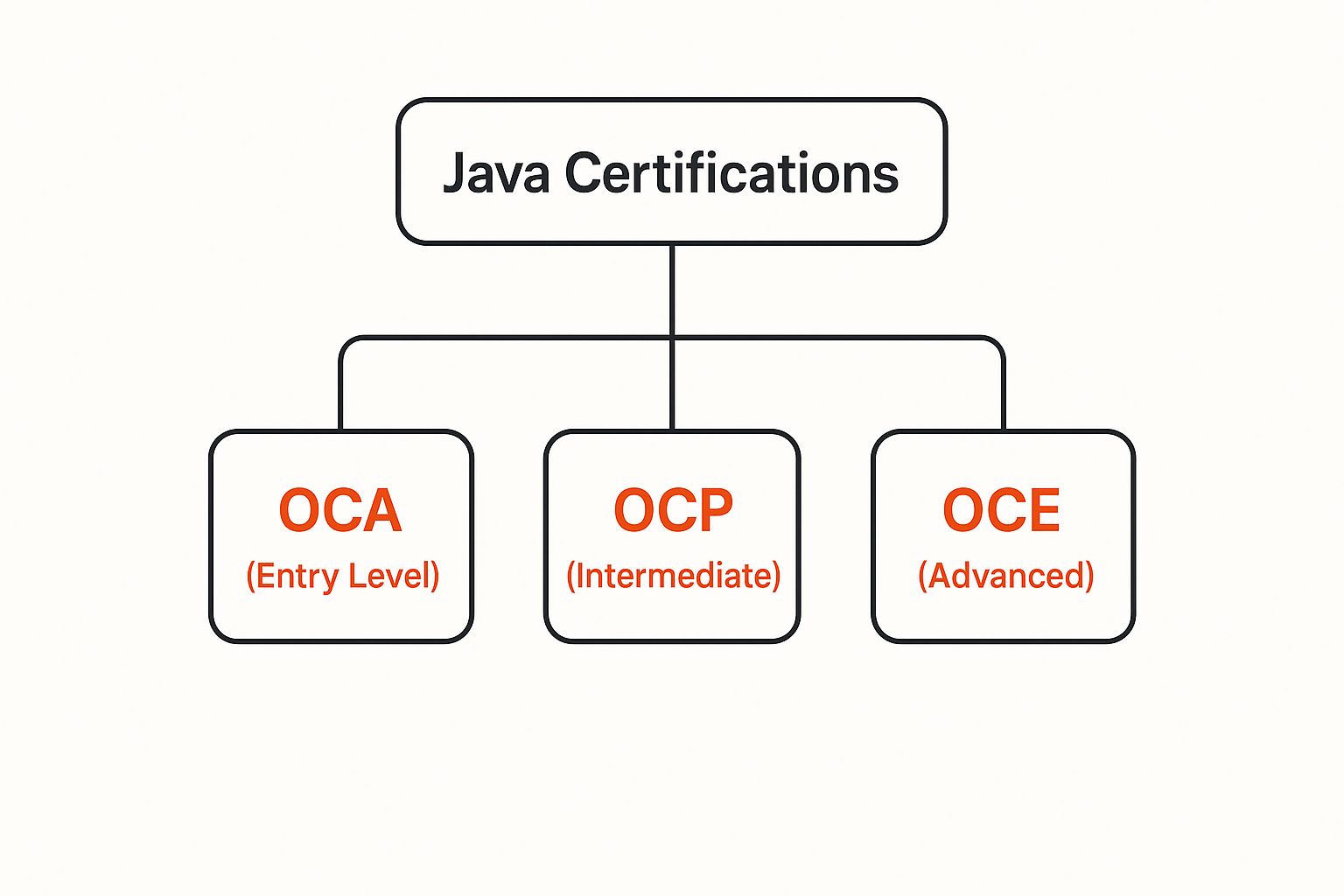In a world overflowing with impressive GitHub portfolios and hands-on coding challenges, it’s fair to ask: do formal certifications still have a place? When it comes to Java, the answer is a resounding yes. These credentials remain a powerful and respected benchmark, acting as a clear, trusted signal of your proficiency in a very competitive tech market.
Why Java Certifications Still Matter

Let's get straight to the point. When your practical work can speak for itself, why bother with an exam? The reality is that in bustling tech hubs, every single advantage counts. A Java certification offers a standardised, universally understood validation of your skills.
Think of it as a common language for expertise. A recruiter in Munich and a hiring manager in Berlin can both see an Oracle Certified Professional (OCP) credential on your CV and instantly grasp your baseline knowledge. They don't need to sift through every project you've ever built to get a measure of your abilities.
A Structured Path to Mastery
Getting certified is about more than just passing a test; it's a commitment. You’re embarking on a structured learning journey. The Java ecosystem is massive and intricate, and the curriculum for a certification forces you to dive into corners of the language you might otherwise skip in your daily coding. This process is brilliant for plugging knowledge gaps and ensuring your fundamentals are rock-solid.
This structured learning pays dividends during those tough technical interviews. You’ll find yourself able to explain not just how to implement a solution in Java, but why a certain approach is the most efficient or robust. It shows a level of dedication to the craft that top companies are always looking for.
A certification acts as your "passport" in the world of professional Java development. It doesn't replace experience, but it opens doors and accelerates your journey by providing third-party validation of your skills.
A Clear Signal in a Noisy Market
In a sea of applicants, a certification makes your CV stand out. For recruiters and the automated systems they use, it’s an immediate flag that you're a serious candidate who has invested in their professional development. This is particularly true in regions like Germany, where formal qualifications carry significant weight.
This focus on credentials is only getting stronger. For instance, Germany is making huge investments in digital education. By 2025, federal initiatives will have funnelled over €5 billion into embedding skills like programming into the education system, reinforcing the value of formal qualifications for software engineering careers. You can learn more about Germany's commitment to tech skills on Nucamp.co.
In the end, pursuing a certification gives you a clear edge in several key areas that fuel career growth:
- Validated Expertise: It’s objective, third-party proof of what you know.
- Enhanced Visibility: Your profile immediately becomes more appealing to recruiters.
- Increased Confidence: You'll walk into technical interviews and discussions better prepared.
- Career Advancement: It can be the key that unlocks promotions and better-paying roles.
Navigating the Oracle Certification Landscape
When you first look into Java certifications, it can feel a bit like staring at a complex London Tube map. There are so many lines and stations, it's hard to know where to start. But for Java, almost all the important routes lead back to one central station: Oracle. As the official custodian of Java, Oracle’s certification path is the gold standard in the industry, offering a clear, respected framework to prove your skills.
Getting your head around this path is the first step. I like to think of it like learning to drive. You don't just get behind the wheel of a high-performance sports car on day one. You start with the theory, pass your test, and then build up experience on the road. Oracle's certifications follow a similar logic, guiding you from a solid foundation all the way to elite-level mastery.
This visual gives you a good overview of the main certification levels that developers typically follow.

As you can see, it's a clear progression. You start by proving your core competence and then move towards specialised credentials that signal true expertise.
To help you understand how these certifications fit together, here's a quick comparison of the main Oracle Java credentials.
Oracle Java Certification Path At A Glance
| Certification Level | Target Audience | Key Skills Validated | Primary Career Benefit |
|---|---|---|---|
| Oracle Certified Professional (OCP) | Mid-level developers with practical experience | Comprehensive knowledge of Java syntax, core APIs, and object-oriented principles. Ability to write robust, production-ready code. | The industry-standard credential that validates job-readiness and gets your CV past initial screening. |
| Oracle Certified Master (OCM) | Senior developers, architects, and technical leads | Advanced architectural design, performance tuning, and solving complex, multi-faceted programming challenges. | An elite credential signifying top-tier expertise, opening doors to leadership and high-level architectural roles. |
This table lays out the journey: from the essential professional benchmark to the pinnacle of technical achievement. Each step is designed for a specific stage in a developer's career.
Your Foundational Credential: The OCP
For most developers serious about their careers, the journey really begins with the Oracle Certified Professional (OCP). Oracle has streamlined its programme over the years, and the OCP now stands as the essential credential that employers recognise and value. Think of it as your professional driver's licence for Java development.
Earning an OCP tells the world you have a deep and practical understanding of the Java language. It confirms you can handle a wide array of programming tasks, from writing solid, dependable code to effectively using Java's core APIs. It's designed for developers who already have some real-world experience under their belt and are ready to have it formally recognised.
The OCP is your passport to professional Java roles. It won't replace a strong portfolio, of course, but it's the official stamp of approval that gets your CV noticed by recruiters and hiring managers.
If you want to demonstrate serious, job-ready Java skills, this certification should be your primary target. It covers the core knowledge every productive member of a development team needs.
Reaching the Expert Tiers: The OCM and Beyond
Once you've secured your OCP and established your professional standing, you can set your sights higher. The path forward leads to more specialised and expert-level certifications that showcase a deeper command of specific Java technologies or architectural patterns.
The peak of this mountain is the Oracle Certified Master (OCM). This isn't just another multiple-choice exam. The OCM is a far more demanding credential that requires passing a tough exam and completing a complex, hands-on performance assignment. It’s an elite status reserved for genuinely seasoned experts.
- Oracle Certified Professional (OCP): This is the industry benchmark for professional Java developers. It proves you have the comprehensive skills for day-to-day Java programming and a solid grasp of its core features.
- Oracle Certified Master (OCM): This is the expert-level credential. Achieving OCM status signals you are in the top tier of Java developers, capable of architecting complex solutions and leading major projects.
To revisit our driving analogy, if the OCP is your licence to drive on public roads, the OCM is your professional racing licence. It proves you can not only handle the car but can also push it to its absolute limits, tackling the most challenging circuits with skill and precision. Pursuing an OCM is a major commitment, typically undertaken by senior developers and architects who want to formalise their elite-level expertise.
Ultimately, choosing the right certification comes down to where you are now and where you want to go. For most, the OCP is the most logical and valuable first step. It provides the credibility needed to advance in a competitive job market and unlocks the door to more senior and specialised opportunities.
The Real-World Benefits of Getting Certified

Let's move past the theory. What concrete results can you actually expect after earning a Java certification? The truth is, the advantages are very real and can directly shape your career path. Having that formal credential translates into measurable wins, from salary negotiations to your day-to-day interactions with your team.
Think of your career as a product you're trying to market. A certification is like premium packaging; it doesn’t change the quality of what’s inside, but it sure makes it more attractive to a potential buyer—in this case, a hiring manager. It signals a level of commitment and quality that makes them want to take a closer look, which can be the difference between your CV being set aside or fast-tracked for an interview.
Strengthening Your Salary Negotiation Power
One of the most compelling reasons to get certified is the undeniable impact on your earning potential. A certification isn’t just a piece of paper; it’s objective proof of your skills, giving you a powerful bargaining chip when it comes time to talk numbers. It shifts the conversation from subjective claims about your abilities to a discussion based on a recognised industry benchmark.
This is especially true in a robust tech market like Germany, where the Java developer salary landscape clearly reflects the value placed on professional qualifications. According to recent salary data, an entry-level Java developer in Germany can expect to earn around €45,000, while mid-level professionals pull in closer to €78,000 annually. A certification can be a key factor in helping you climb into that higher bracket much faster.
A certification acts as a formal benchmark of your expertise. It provides a solid foundation for requesting a higher salary because it validates that your skills meet an objective, industry-wide standard of excellence.
This validation gives you the confidence to ask for what you're worth. It's not just about what you know, but about being able to prove it in a way that HR departments and hiring managers understand and respect.
Boosting Your Visibility in the Job Market
In today’s competitive hiring environment, your CV often has to get past a sophisticated Applicant Tracking System (ATS) before a human ever lays eyes on it. These systems are programmed to scan for specific keywords and qualifications, and a credential like "Oracle Certified Professional" is precisely the kind of high-value keyword that ensures your application makes the cut.
Once your CV lands on a recruiter's desk, the certification continues to do the heavy lifting. It’s an immediate point of differentiation. In a stack of fifty applications, those with recognised certifications in java are almost always reviewed first because they represent a lower risk and a more qualified candidate pool. It's a simple, effective way for recruiters to filter and prioritise.
This boosted visibility can lead directly to more interview opportunities, including for roles you might not have been considered for otherwise. As you move into more senior positions, you might find our guide on https://www.iknowly.com/blogs/program-manager-interview-questions helpful for preparing.
Gaining Credibility and Professional Respect
The benefits of certification don't just stop once you’ve landed the job. Within your own development team, holding a credential can significantly enhance your professional standing. It shows a serious commitment to your craft and a deep understanding of Java's core principles, earning you respect from both your peers and management.
This newfound credibility translates into several practical advantages:
- Greater Influence: Your opinions in technical discussions and code reviews will likely carry more weight.
- Leadership Opportunities: You become a natural candidate for leading new projects or mentoring junior developers.
- Increased Trust: Colleagues and managers will have more confidence in your ability to deliver high-quality, robust code.
Understanding how a Java certification fits into the bigger picture is key. For more great insights, explore these tips on advancing your software developer career. Ultimately, the effort you put into earning a certification pays dividends not just in your payslip, but in the respect and opportunities you gain every single day.
How to Create Your Certification Study Plan

Let's get one thing straight: passing a professional exam isn't about pulling an all-nighter and hoping for the best. Success with certifications in java comes from a methodical plan, not luck. This process turns what feels like a massive mountain into a series of small, manageable hills, building your knowledge and your confidence along the way.
Think of it like training for a marathon. You wouldn’t just show up on race day and expect to finish. You’d follow a structured training schedule, slowly building your endurance and tracking every milestone. Preparing for a Java certification demands that same kind of discipline.
Deconstruct the Exam Objectives
Your first move, and easily the most critical, is to head straight to Oracle's website and download the official exam objectives. This isn't just a friendly guide; it’s the literal blueprint for the test. Every single question you’ll encounter is born from these very topics.
I always tell people to print this document. Use it as your master checklist. It lays out exactly what you need to know, from core language features and APIs to the trickier concepts like concurrency or functional programming. Breaking down these objectives completely removes the guesswork from your study sessions.
As you truly master a topic, check it off. It sounds simple, but that small action gives you a real sense of progress and keeps you locked in on what's next. This active tracking is a fundamental part of building a solid plan. For a broader perspective on structuring professional goals, our guide on creating a career development plan provides an excellent framework.
Assemble Your Study Resources
With your blueprint ready, it's time to gather your learning tools. A common pitfall I see is people relying on a single book or course. A much better approach is to use a mix of materials. This way, the concepts are reinforced from different angles, which is great for helping the information stick.
Your resource toolkit should have a few key items:
- Official Oracle Materials: Start with any study guides or documentation from Oracle itself. You can't get more authoritative than the source.
- Highly-Rated Study Books: Look for books written specifically for your exam. Certain authors have become mainstays in the Java certification community for a reason.
- Interactive Online Courses: Sometimes, watching someone explain a tough concept or coding it live on a platform can make all the difference.
- Mock Exams: This is non-negotiable. Practice exams are crucial for getting a feel for the real thing, managing your time, and—most importantly—finding your weak spots before the test does.
Don't just read about the code—write the code. The Java certification exams test practical application, not just theory. Set up a simple project and write small programmes that use every concept you learn.
Build a Realistic Study Schedule
Consistency trumps intensity every time. Studying for one focused hour each day is far more effective than a draining seven-hour cram session on a Sunday. Be honest with yourself about your personal and professional commitments, and craft a schedule you can actually follow.
Break your plan into manageable chunks. For example:
- Weeks 1-2: Focus on Java Basics and Data Types. Read the relevant book chapters, watch the videos, and then do the practice problems.
- Weeks 3-4: Move on to Object-Oriented Principles. Apply what you've learned by building simple classes and inheritance structures in your practice project.
- Weeks 5-6: Tackle the Core APIs, like the Collections Framework. Write code that uses different lists, sets, and maps to solve problems.
- Final 2 Weeks: Dedicate this entire period to taking full-length mock exams. Go through every single wrong answer and figure out why you got it wrong. This is where the real learning happens.
This structured approach makes sure you cover all your bases without getting overwhelmed. When you treat your preparation like a professional project—with clear milestones and deadlines—you're setting yourself up for success.
Tapping into the Java Community for Success
Studying for a Java certification can sometimes feel like you’re on a solo mission, but it really doesn't have to be. One of the most powerful resources you have is the incredibly active global Java community. Getting involved can genuinely accelerate your learning, keep your motivation high, and offer practical insights you just can't get from a textbook.
Think of it this way: studying alone is like being in a library, which is great for building a foundation. But engaging with the community is like stepping into an expert-led workshop. It’s where abstract concepts get debated, clarified, and connected to real-world problems. This process helps you smash through roadblocks and see the material from completely new angles.
Joining Java User Groups and Online Forums
A great first step is to find your local Java User Group (JUG). These are grassroots groups that meet up regularly to talk about all things Java. When you attend a JUG meeting, you're in a room with seasoned developers, many of whom have probably sat the exact exam you're aiming for. They can give you straight-up advice, share study materials, and offer a bit of encouragement when you feel stuck.
Online forums are just as crucial. Places like Stack Overflow, Reddit's r/javahelp, and specific certification forums are buzzing with activity. On these platforms, you can:
- Ask for help with tricky topics that have you stumped.
- See how others tackled problems you’re wrestling with.
- Get recommendations for the best mock exams and study guides.
- Keep up with any changes to the exam syllabus or format.
This collective brainpower is a huge advantage. You’re no longer just learning from a book; you’re learning from the combined experience of thousands of developers who have been exactly where you are now.
The Power of Conferences and Networking
While online groups are fantastic, nothing really replaces the buzz of an in-person event. Java conferences are your chance to learn directly from the experts who are literally shaping the future of the language and its ecosystem. But these events are about more than just sitting in talks; they're about building real connections.
The relationships you forge in the Java community can become just as valuable as the certification itself. A strong professional network is a support system for motivation, mentorship, and even career opportunities long after you’ve passed your exam.
A perfect example is JCON EUROPE, the top in-person Java community conference held each year in Germany. It’s organised by the Java User Group Oberpfalz and JAVAPRO Magazine and has become a major hub for networking and learning. JCON EUROPE 2025 is expecting developers from over 34 countries, with workshops and hands-on sessions that cover skills directly relevant to certifications in java. The event highlights just how central Germany has become to the European Java scene. You can discover more about the JCON EUROPE 2025 conference and its programme.
Of course, networking effectively, especially in a professional setting abroad, means being culturally aware. To make a good impression, it helps to understand local business customs. For some helpful pointers, you might want to check out our guide on German business etiquette.
By jumping into the Java community—whether online, at a local JUG, or at a big conference—you're building an incredible support system. This shared journey gives you the drive and practical wisdom you need to not only pass your exam but to truly excel as a certified Java professional.
Answering Your Java Certification Questions
Deciding to pursue a professional certification is a big step, so it’s only natural to have a few questions. Committing to a Java certification takes time and effort, and you deserve clear answers before you dive in. We’ve pulled together some of the most common questions we hear from developers to clear up any confusion and help you move forward with confidence.
Think of this as your practical guide to the nitty-gritty details, from figuring out where to start to understanding the real-world value of that certificate. Let's get into the specifics.
Which Java Certification Is Best to Start With?
If you're a developer looking to prove you have professional-grade Java skills, the Oracle Certified Professional (OCP) Java SE Programmer certification is the one to aim for first. Oracle used to offer an associate-level credential, but they've since simplified their pathway. Now, the OCP is the foundational certification that employers really notice.
This exam confirms you have a solid, comprehensive understanding of the core language features—the kind of knowledge you'll use every day in a professional Java role. Before you even think about booking the exam, make sure you have solid, hands-on experience with Java fundamentals. The OCP isn't about memorising theory; it's designed to test practical, on-the-job knowledge.
How Long Does It Take to Prepare for the OCP Exam?
Honestly, this really depends on how much you already use Java. For a developer who's coding in Java daily, a focused study plan over two to three months is often enough to feel prepared.
On the other hand, if your day-to-day work doesn't involve as much hands-on Java, it's smarter to give yourself more runway. Plan for a longer, more consistent study period of four to six months.
The key isn't how fast you study, but how consistently you do it. A structured schedule with regular practice is far more effective than trying to cram everything in at the last minute. This methodical approach builds knowledge that actually sticks.
This gives you enough time to work through all the official exam topics, test yourself with practice exams to find your weak spots, and strengthen those areas without the stress of a looming deadline.
Do Java Certifications Expire?
This is a great question, and an important one. The short answer is no. Oracle's Java certifications, which are tied to a specific version like Java SE 11 or Java SE 17, do not have a formal expiration date. Once you pass the exam, that certification is yours for good.
However, technology doesn't stand still. While your certificate is still technically valid, one for an older version of Java will naturally lose some of its relevance as the language evolves and new features become standard practice.
To show employers that your skills are sharp and up-to-date, many certified pros choose to upgrade their certification to a newer version every few years. This demonstrates a real commitment to keeping up with the Java ecosystem. For international professionals, showing current skills is especially crucial; you can find more tips in our guide on working in Germany as a foreigner.
This approach of continuous learning not only keeps your knowledge fresh but also sends a clear signal to the job market that you are a dedicated and forward-thinking developer.
Navigating your career path in a new country can be complex. iknowly connects you with verified German professionals for 1:1 video consultations, offering expert guidance on everything from CV optimisation to interview preparation. Get the personalised advice you need to succeed at iknowly.com.

